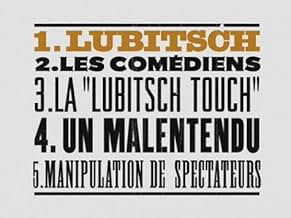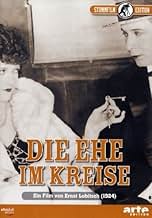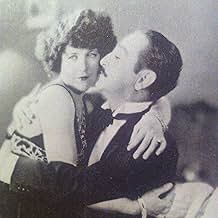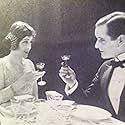VALUTAZIONE IMDb
7,0/10
1559
LA TUA VALUTAZIONE
Aggiungi una trama nella tua linguaProfessor Stock and his wife Mizzi are always bickering. Mizzi tries to seduce Dr. Franz Braun, the new husband of her good friend Charlotte.Professor Stock and his wife Mizzi are always bickering. Mizzi tries to seduce Dr. Franz Braun, the new husband of her good friend Charlotte.Professor Stock and his wife Mizzi are always bickering. Mizzi tries to seduce Dr. Franz Braun, the new husband of her good friend Charlotte.
- Premi
- 2 vittorie
Trama
Lo sapevi?
- QuizMotion Picture Magazine (February-July 1924): 'In making the kissing scene in "The Marriage Circle," where the dutiful wife smacks another man other than her husband by mistake, Herr Lubitsch made Florence Vidor and Creighton Hale repeat the event exactly thirty-nine times before the kiss was right. Florence is a very lovely lady, but... well, thirty-nine times!'
- BlooperOn the letter that Dr. Braun writes asking Mizzi to choose another doctor, the printed address on Dr. Braun's stationery misspells Vienna as "Wein"; it is correctly printed as "Wien" as a return address on the envelope of the same letter.
Recensione in evidenza
Settling in Hollywood and freed from the whims of Mary Pickford, Ernst Lubitsch moved from the independent distributor United Artists to the minor studio Warner Brothers where he was allowed to make the first film in his career that really feels like a Lubitsch film. He'd touched on the ideas and tone here and there, mostly in his comedies The Doll and The Oyster Princess, but there was an embrace of silly physical comedy that seemed a bit out of step with his later work while engaging in more overt forms of farce. Not to imply that those didn't work, but they were just different. Now, with The Marriage Circle, Lubitsch was quickly settling into his domestic and romantic concerns between men and women that embrace wittiness rather than silliness.
Set in Vienna, the film is the story of two couples and a single man. The first couple are Professor Josef Stock (Adolphe Menjou) and his wife Mizzie (Marie Prevost), a pair who have been married for some time and have lost the spark of romance between them. Mizzie is best friends to Charlotte (Florence Vidor) who is newly married to Dr. Braun (Monte Blue), and the couple are deeply, earnestly in love. Dr. Braun has an associate, Dr. Mueller (Creighton Hale) who is smitten with Charlotte but also has the wherewithal to not actually act on it. Jealousy, intended adultery, and mistaken intentions end up driving the plot of the film as Mizzie decides that she's going to have an affair with Dr. Braun because he can obviously bring romance to her that her husband no longer offers. Meanwhile, Charlotte confides in Mizzie because she thinks that Dr. Braun is actually intent on an affair with the young Miss Hofer (Esther Ralston), and Professor Stock is so convinced of his wife's infidelity that he hires a private detective to follow her and gather evidence (that he guarantees he'll collect and lead to a divorce).
The joys in the film early are the lightly farcical elements, mostly around Charlotte thinking that Dr. Braun is infatuated with Miss Hofer, so she ends up pushing Mizzie towards Dr. Braun, thinking that it will blunt Dr. Braun's potential infidelities. The look on Mizzie's face as Charlotte literally pushes her into Dr. Braun's arms during a dance is really funny. And yet, there's always a satirical and sharp edged undertone to what's going on. Charlotte knows that something is wrong somewhere, and she trusts the one woman she shouldn't to help fix it. That helps the film veer really closely to something far more tragic than it turns out to be.
Dr. Braun ends up being a good man caught up in the wiles of an unscrupulous woman, and it seems like everything is going to go against him. Dr. Mueller thinks that he's cheating on his wife with Mizzie. Mizzie thinks he's just playing hard to get. Professor Stock ends up convinced, through his private investigator's work, that Dr. Braun is definitely having an affair with Mizzie. It's Dr. Braun's social standing that's at risk here, never his business or his life, but you can feel the edges of everything collapsing around him even though he has no way of making it better despite his best efforts. For a solid twenty minutes, I was convinced that this was going to be a tragedy.
And then things turn around. Just desserts are served. Social reputations are saved, and Dr. Braun ends up with the last laugh while two unlikely potential lovers end up leaving Vienna together. There's real delight in this ending because the character work had been so solidly built.
Now, I've complained pretty consistently that Lubitsch's characters have been thin through his silent period, in particular in his more tragic skewing historical films. I wonder if that's something to do with the writer of the film's scenario, Paul Bern, an Irving Thalberg devotee later in life. Lubitsch had regularly worked with Hanns Kraly and Norbert Falk while in Germany, but Bern seems to have understood how to build character in a silent film more naturally. The film's story is stripped of unnecessaries. It's not intimately tied to Vienna itself and could honestly have taken place in any major city of the time. The jobs of the individuals aren't that important and rarely get mentioned or really addressed directly. It's really about building up a cache of five characters and letting them operate within the rather plain looking surroundings, offering them a chance to bring themselves out of the realm of caricature and into actual character. Lubitsch allows his camera to let Mizzie be herself, her own awful self, and Stock to be himself, his own, detached self, in such a way that their relationship makes sense quickly, setting the groundwork very efficiently for Mizzie to understandably form designs on a more romantic man than her own husband.
The Marriage Circle is quite comfortably Lubitsch's most successful film up to this point. Whether it was the freedom from German company Ufa's house styles, his former writers, lessons he'd learned working for Mary Pickford, or the introduction of a new, talented writer in Paul Bern, Lubitsch was finding his voice more comfortably than ever. It may not end up being one of Lubitsch's great films, but it's the first film that is firmly Lubitsch while also being consistently entertaining and even a bit touching.
Set in Vienna, the film is the story of two couples and a single man. The first couple are Professor Josef Stock (Adolphe Menjou) and his wife Mizzie (Marie Prevost), a pair who have been married for some time and have lost the spark of romance between them. Mizzie is best friends to Charlotte (Florence Vidor) who is newly married to Dr. Braun (Monte Blue), and the couple are deeply, earnestly in love. Dr. Braun has an associate, Dr. Mueller (Creighton Hale) who is smitten with Charlotte but also has the wherewithal to not actually act on it. Jealousy, intended adultery, and mistaken intentions end up driving the plot of the film as Mizzie decides that she's going to have an affair with Dr. Braun because he can obviously bring romance to her that her husband no longer offers. Meanwhile, Charlotte confides in Mizzie because she thinks that Dr. Braun is actually intent on an affair with the young Miss Hofer (Esther Ralston), and Professor Stock is so convinced of his wife's infidelity that he hires a private detective to follow her and gather evidence (that he guarantees he'll collect and lead to a divorce).
The joys in the film early are the lightly farcical elements, mostly around Charlotte thinking that Dr. Braun is infatuated with Miss Hofer, so she ends up pushing Mizzie towards Dr. Braun, thinking that it will blunt Dr. Braun's potential infidelities. The look on Mizzie's face as Charlotte literally pushes her into Dr. Braun's arms during a dance is really funny. And yet, there's always a satirical and sharp edged undertone to what's going on. Charlotte knows that something is wrong somewhere, and she trusts the one woman she shouldn't to help fix it. That helps the film veer really closely to something far more tragic than it turns out to be.
Dr. Braun ends up being a good man caught up in the wiles of an unscrupulous woman, and it seems like everything is going to go against him. Dr. Mueller thinks that he's cheating on his wife with Mizzie. Mizzie thinks he's just playing hard to get. Professor Stock ends up convinced, through his private investigator's work, that Dr. Braun is definitely having an affair with Mizzie. It's Dr. Braun's social standing that's at risk here, never his business or his life, but you can feel the edges of everything collapsing around him even though he has no way of making it better despite his best efforts. For a solid twenty minutes, I was convinced that this was going to be a tragedy.
And then things turn around. Just desserts are served. Social reputations are saved, and Dr. Braun ends up with the last laugh while two unlikely potential lovers end up leaving Vienna together. There's real delight in this ending because the character work had been so solidly built.
Now, I've complained pretty consistently that Lubitsch's characters have been thin through his silent period, in particular in his more tragic skewing historical films. I wonder if that's something to do with the writer of the film's scenario, Paul Bern, an Irving Thalberg devotee later in life. Lubitsch had regularly worked with Hanns Kraly and Norbert Falk while in Germany, but Bern seems to have understood how to build character in a silent film more naturally. The film's story is stripped of unnecessaries. It's not intimately tied to Vienna itself and could honestly have taken place in any major city of the time. The jobs of the individuals aren't that important and rarely get mentioned or really addressed directly. It's really about building up a cache of five characters and letting them operate within the rather plain looking surroundings, offering them a chance to bring themselves out of the realm of caricature and into actual character. Lubitsch allows his camera to let Mizzie be herself, her own awful self, and Stock to be himself, his own, detached self, in such a way that their relationship makes sense quickly, setting the groundwork very efficiently for Mizzie to understandably form designs on a more romantic man than her own husband.
The Marriage Circle is quite comfortably Lubitsch's most successful film up to this point. Whether it was the freedom from German company Ufa's house styles, his former writers, lessons he'd learned working for Mary Pickford, or the introduction of a new, talented writer in Paul Bern, Lubitsch was finding his voice more comfortably than ever. It may not end up being one of Lubitsch's great films, but it's the first film that is firmly Lubitsch while also being consistently entertaining and even a bit touching.
- davidmvining
- 6 apr 2023
- Permalink
I più visti
Accedi per valutare e creare un elenco di titoli salvati per ottenere consigli personalizzati
- How long is The Marriage Circle?Powered by Alexa
Dettagli
Botteghino
- Budget
- 212.000 USD (previsto)
- Tempo di esecuzione1 ora 25 minuti
- Mix di suoni
- Proporzioni
- 1.33 : 1
Contribuisci a questa pagina
Suggerisci una modifica o aggiungi i contenuti mancanti

Divario superiore
By what name was Matrimonio in quattro (1924) officially released in Canada in English?
Rispondi




























